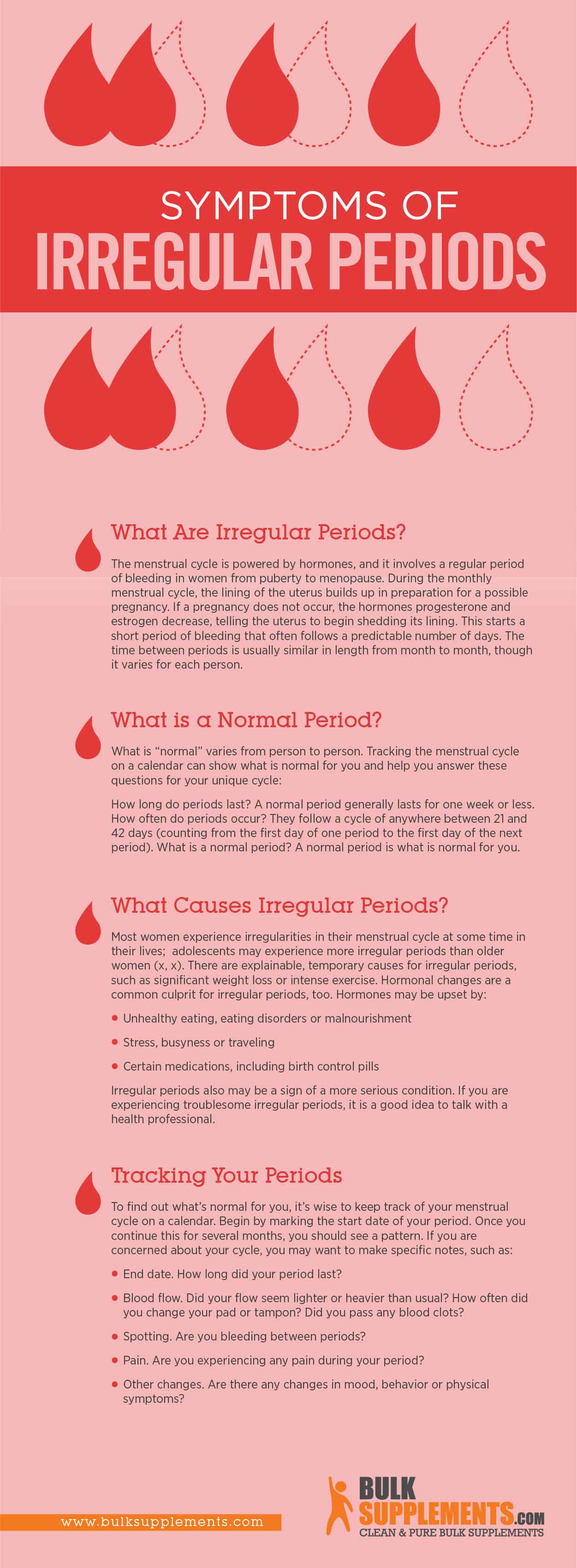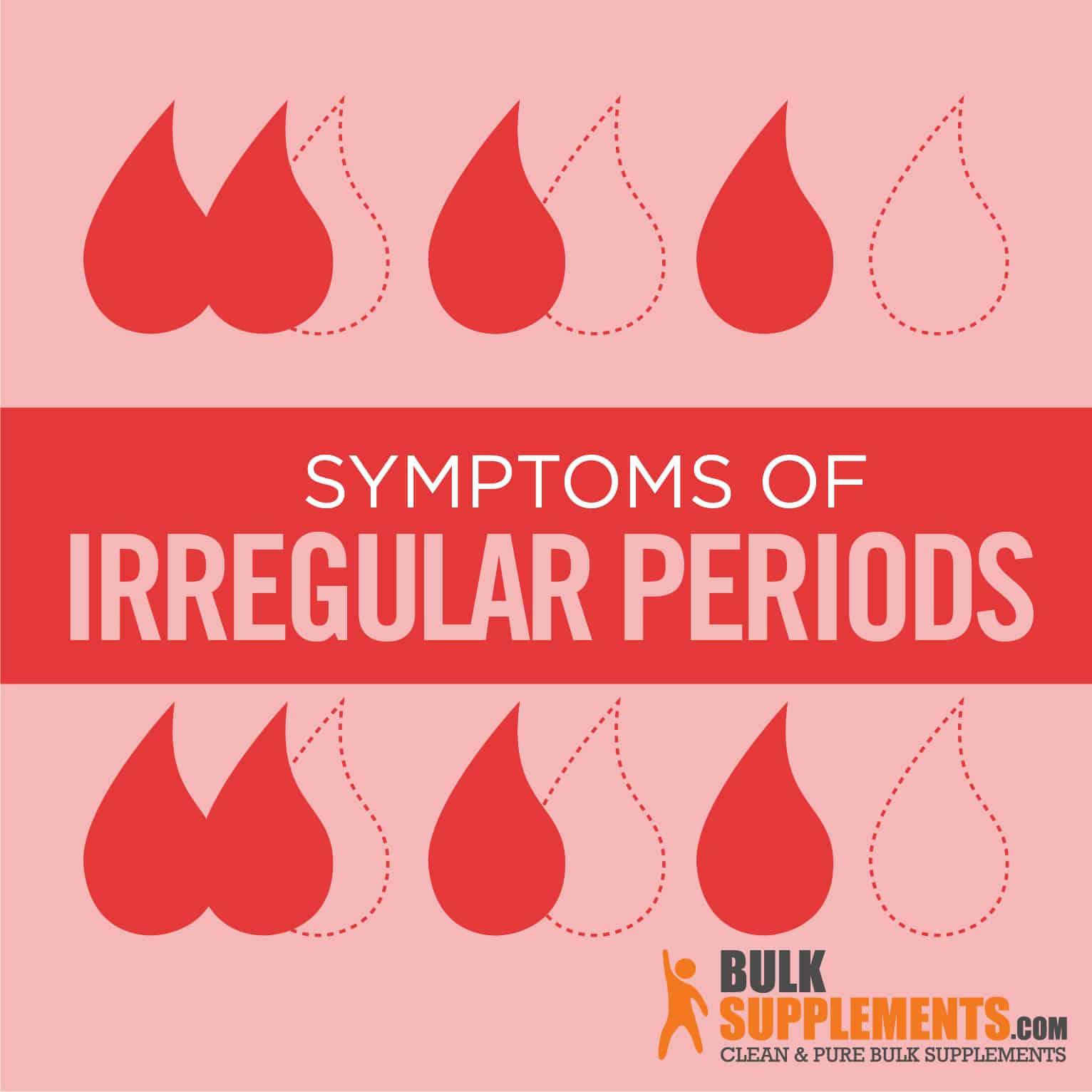What Are Irregular Periods?
The menstrual cycle is powered by hormones, and it involves a regular period of bleeding in women from puberty to menopause. During the monthly menstrual cycle, the lining of the uterus builds up in preparation for a possible pregnancy. If a pregnancy does not occur, the hormones progesterone and estrogen decrease, telling the uterus to begin shedding its lining. This starts a short period of bleeding that often follows a predictable number of days. The time between periods is usually similar in length from month to month, though it varies for each person.
Sometimes the cycle goes haywire and periods don’t come as planned, arrive too often, or involve heavier-than-normal bleeding. When a woman experiences any of these occurrences, she is experiencing irregular periods (x).
Irregular periods are a change in a woman’s regular menstrual cycle. This can mean that any one of the following happens:
- The number of days between periods changes
- The length of bleeding changes
- The amount of bleeding becomes heavier
- Pain or other symptoms occur
What is a Normal Period?
What is “normal” varies from person to person. Tracking the menstrual cycle on a calendar can show what is normal for you and help you answer these questions for your unique cycle:
How long do periods last? A normal period generally lasts for one week or less. How often do periods occur? They follow a cycle of anywhere between 21 and 42 days (counting from the first day of one period to the first day of the next period). What is a normal period? A normal period is what is normal for you (x).
What Causes Irregular Periods?
Most women experience irregularities in their menstrual cycle at some time in their lives; adolescents may experience more irregular periods than older women (x, x). There are explainable, temporary causes for irregular periods, such as significant weight loss or intense exercise. Hormonal changes are a common culprit for irregular periods, too. Hormones may be upset by:
- Unhealthy eating, eating disorders or malnourishment
- Stress, busyness or traveling
- Certain medications, including birth control pills
Irregular periods also may be a sign of a more serious condition. If you are experiencing troublesome irregular periods, it is a good idea to talk with a health professional. Health risks associated with irregular periods include (x):
- Thyroid disorders. An overactive or underactive thyroid can cause a hormone imbalance, which affects your menstrual cycle.
- Uncontrolled diabetes. The menstrual cycle is affected by diabetes, because of fluctuating hormone levels (x).
- Uterine fibroids. Fibroids put pressure on the uterine lining, which may cause menstrual pain or heavier bleeding (x).
- STDs (Sexually Transmitted Diseases). Pelvic inflammatory disease (PID) is an infection of the female reproductive system causing abnormal bleeding. PID is a serious complication of an STD.
- Cervical or uterine cancer. Spotting or bleeding between periods may occur with these types of cancer.
- Endometriosis. This condition is a disruption of the normal growth of uterine cells. Among other symptoms, this condition can cause severe pain and irregular periods.
- Polycystic Ovary Syndrome (PCOS). Irregular or heavy periods may be signs of polycystic ovary syndrome. Polycystic ovary syndrome causes a hormonal imbalance and may affect 10 percent of women, but this condition often goes undiagnosed (x).

Tracking Your Periods
To find out what’s normal for you, it’s wise to keep track of your menstrual cycle on a calendar. Begin by marking the start date of your period. Once you continue this for several months, you should see a pattern. If you are concerned about your cycle, you may want to make specific notes, such as:
- End date. How long did your period last?
- Blood flow. Did your flow seem lighter or heavier than usual? How often did you change your pad or tampon? Did you pass any blood clots?
- Spotting. Are you bleeding between periods?
- Pain. Are you experiencing any pain during your period?
- Other changes. Are there any changes in mood, behavior or physical symptoms?
Irregular Periods: Remedies & Supplements
Preventing irregular periods is possible, and there are ways to alleviate symptoms naturally. However, if irregular periods are becoming your new normal, seek help from a health practitioner.
- Eat healthy. Eating a balanced diet, rich in vitamins and minerals will help the hormones work at optimum levels. Food and drinks containing excess sugar and caffeine can disrupt the hormonal balance. Choose whole grains, lean meats, vegetables and low-fat dairy. Avoid skipping meals and carry healthy snacks.
- Add strategic foods. Some foods like pineapple and papaya fruit extract support the health of the uterine lining, which can ease your normal period flow. Cinnamon bark extract may regulate insulin, which can keep ovulation regular (x).
- Relax and take care of yourself. Stress is a common cause of irregular periods. Try a new, relaxing activity that you enjoy. Do it regularly. Supplements for calm include chamomile extract, lavender, valerian root and ashwagandha.
- Move your body. Getting regular exercise releases stress and invites feel-good hormones to boost your mood.
Supplements for Female Health
Because of a woman’s monthly flow, she may benefit from a calculated boost of nutrition. Nutrients and supplements that support a woman’s unique health needs include:
- Iron. Women require more iron than men to replace the iron they lose in their monthly period. Iron deficiency is the most common nutrient deficiency in women (x).
- Calcium. Calcium supports strong bones, muscles and nerves. It’s important to build bone density because bone mass is lost later in life.
- Folic Acid. Folic acid is important for women of childbearing age since it prevents birth defects.
- Magnesium. Magnesium is especially important for women over 40 because it prevents bone loss that may lead to osteoporosis.
- Chasteberry. Chasteberry is one of the most commonly used supplements for female reproductive health. It has been used for physical symptoms of PMS such as bloating, headaches and breast pain (x).
- St. John’s Wort. Some people consider St. John’s wort to be a natural alternative to antidepressant medication. St. John’s wort affects two neurotransmitters (serotonin and norepinephrine) that boost your mood.
The Bottom Line
Regular menstrual periods are a sign that a woman’s body is working normally. A woman should experience predictable periods unless she is pregnant, breastfeeding or postmenopausal. Sometimes, the regular monthly period becomes irregular. Irregularities may include changes in length or amount of flow. When this happens, it’s important to examine why. A change in lifestyle such as stress or diet can change the regularity of the menstrual cycle.
However, there may also be an underlying health condition that causes irregular periods. Recording data on your periods will help you see patterns and will give you a baseline for what is normal for you. There are ways to get back on track if your periods have become irregular. Adding healthy foods, supplements or a new relaxing routine may bring things back around. However, if irregular periods persist, it’s important to seek the advice of a health professional.


